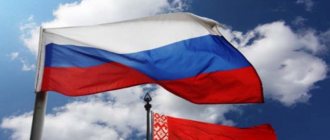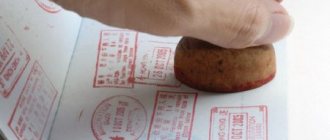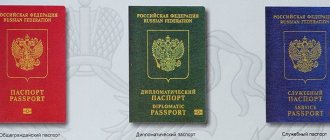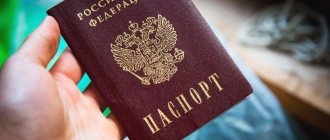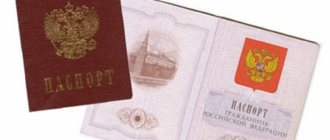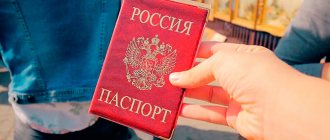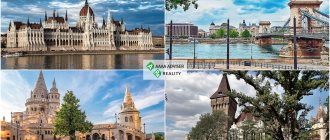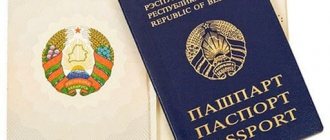Citizenship of the Republic of Moldova through naturalization
Issues of nationality in Moldova are regulated by the Constitution, international treaties, the Law “On Citizenship of the Republic of Moldova” (No. 1024-XIV), adopted on June 2, 2000, and related legal norms. The Republic does not have any agreement with the Russian Federation regarding issues of statehood. A Russian can become a citizen of Moldova:
- by birth (a minor born on the territory of the Republic of Moldova can claim status according to the “law of the soil”);
- as a result of adoption;
- by recognition;
- after restoration of citizenship;
- as a result of naturalization.
It is impossible to buy the status of a citizen of the Republic of Moldova, as well as the Russian Federation. For persons who have previously had no connection with Moldova, the last option is suitable - admitting foreigners to citizenship after submitting an application and the necessary package of documents. This procedure is discussed in Art. 17 of the Law. It defines the conditions for naturalization:
- legal and continuous residence in the Republic of Moldova for: 10 years - general requirement; 8 years - for stateless persons, refugees, including political ones; 5 years before reaching adulthood; 3 years for those who were married, live with children or parents who are citizens of the Republic of Moldova;
- knowledge of the basics of the country's Constitution;
- the presence of a legitimate source of income (these are: wages, profits from business activities, benefits, scholarships, alimony, deposits in a bank account);
- successfully passed the Romanian language test (Moldovan, as it is called in the Constitution; they are almost identical). Art. 18 states: sufficient knowledge of a language is the ability to understand information for everyday and cultural purposes, to participate in communication, to read and write. The test is not required for age pensioners and permanently disabled people;
- integrity, no criminal record.
A foreigner who wishes to obtain a RM passport through naturalization is obliged to renounce other citizenship.
How to obtain Moldovan citizenship: legal ways
To become a citizen of Moldova, you will need to choose one of the immigration methods provided for by the country’s legislation. Based on the chosen method, a residence permit is issued, valid for 1-2 years. Upon expiration, the document will need to be renewed. The most common and simple types of relocation include:
- Labor immigration.
- Education.
- Family reunion/marriage.
- Repatriation.
- Treatment.
- Volunteer/Religious Activities.
- Interests of the republic.
- Naturalization.
- Asylum Law.
The correct choice of immigration method will significantly simplify the procedure for obtaining a residence permit, and subsequently Moldavian citizenship. Before making a decision, it is advisable to study each type of relocation in detail.
Employment
The method is simple; you can obtain a residence permit in accordance with it quite quickly. To do this, you will need to obtain a work permit in the republic (permanent or temporary). It is issued by the Department of Migration Issues. A temporary permit is issued to foreigners for 1 year. After the stated period has expired, the document can be easily extended if necessary. Permanent permission can be obtained by highly qualified specialists, employees specially called by the government, as well as relatives of repatriates and foreign citizens reunited with their families.
Getting an education
An immigration certificate is issued to foreigners wishing to receive education in Moldova. In this case, a residence permit is issued exclusively for the period of study. Today, higher education received at Moldovan universities is recognized in Europe, and also has a number of other advantages:
- Student programs.
- Low cost.
- Decent level of knowledge.
After the expiration of the study period, graduates of Moldovan universities can remain in the country for permanent residence in accordance with another basis. Among them are employment, marriage, starting a business and some others.
Family Reunion/Marriage
Citizenship of Moldova is easy to obtain for foreigners who have relatives living in the republic. These can be legal and common-law spouses, minor children (natural or adopted), as well as persons dependent on foreign citizens (for example, elderly parents). To obtain a residence permit without a marriage certificate, a foreign spouse must have a common child with a citizen of Moldova (native or adopted). Official spouses of citizens of the republic can also receive an immigration certificate after entering into a marriage. In this case, the place where the marriage was registered does not matter. The immigration method through family reunification/marriage allows you to obtain Moldovan citizenship quickly - after only 3 years of residence in the country.
Dual citizenship for residents of the Russian Federation
Does admission to citizenship of the Republic of Moldova through naturalization always entail the need to renounce Russian citizenship? Russian legislation distinguishes between dual and second citizenship. Thus, Tajiks and Turkmens can become binationals in the Russian Federation, since our countries have signed international agreements on issues of nationality.
Second citizenship, third, etc. are not prohibited, but a foreign passport will not have legal force in Russia. A citizen of both the Russian Federation and the Republic of Moldova is perceived by us only as a Russian. In Moldova, dual citizenship is also not prohibited. Ch. IV of Law No. 1024-XIV states that this right can be exercised by:
- Moldovan children by birth or adoption;
- citizens whose spouse is a foreign national;
- persons subject to an international treaty;
- foreigners who are not allowed to renounce citizenship by the laws of their country.
Also, the requirement to renounce Russian citizenship can be avoided if you take advantage of the right to citizenship by recognition. Even those who live outside the Republic (in the Russian Federation, for example):
- persons who were born in the Republic of Moldova or those whose ancestors (blood relatives in a direct line) were born on its territory;
- those who lived in Northern Bukovina, Bessarabia, MASSR, Hertsa district and their descendants (if registered in Moldova) before June 28, 1940;
- those who either themselves or were forced to leave the Republic of Moldova after June 28, 1940, their descendants.
That is, any Russian who in the past was related to the Republic of Moldova has the right to obtain Moldovan citizenship by recognition, without leaving the Russian Federation - through a diplomatic mission or consulate. Having received a biometric passport, he must inform the territorial department of the Main Department of Migration Affairs of the Ministry of Internal Affairs about this within two months.
Who issued the Moldovan passport? Translation agency: Moldovan documents, translations for Moldova
The identity card of a citizen of the Republic of Moldova consists of two parts:
- A plastic card;
- Paper vertical sheet.
Both parts of the ID are issued simultaneously, are mandatory and are not valid without the other.
How do we translate a Moldovan passport?
Even the simplest service can cause a number of irreparable errors if you turn to a non-professional, therefore, below we provide a complete translation of all abbreviations and entries that will help you control the quality of the completed order! Be careful and check everything thoroughly before accepting work.
All data is presented in three languages: Moldovan, English and French.
Data in English:
Republic of Moldova
— Republic of Moldova (be careful, translation “Moldavian Republic” is not allowed).
Document Type
- document type, in this case the designation
PA
- “passport”
Country Code
- country code - the international designation
MDA
is not translated.
Passport Serial No.
- passport ID. Duplicated on every page. Surname
- surname.
Advice: Last name and first name must be checked against the migration card/residence permit or according to previously issued documents.
Given Name(s)
— name(s)
Nationality
— citizenship
Date of Birth
— date of birth (day/month/year)
Personal Number
— personal number
Sex
— gender
Place of Birth
— place of birth
Date of Issue
— date of issue
Issuing Authority
— authority that issued the passport
Date of Expiration
- validity period until
Holder’s Signature
- signature of the owner
Holder’s Blood Type
- owner’s blood type
Ordering a translation of a Moldovan passport
If you want to receive a quick transfer without visiting the office, then fill out a special form, attaching a scan of all pages of your passport in pdf format, and we will contact you within 10 minutes. Or you can always come to our office: Krasnodar, st. Chapaeva 104 and place your order in person.
Important facts:
- We don't have queues.
- registration takes from 2 to 5 minutes.
- Full-time translators will start working instantly.
- We go to the Notary ourselves.
- you receive the finished work exactly at the appointed time.
- We always welcome new customers and treat every order with trepidation.
Our translation agency will come to your aid, no matter where you are in the world. If you need to translate a language taking into account the requirements of Russia and Moldova, write to us and attach scans of documents requiring translations to the letter. If you tell us what we need to do, then we will answer your question about translation faster and more accurately.
The advantage of our translation agency is that we can notarize the translator’s signature in the Moldovan language, we can attach the translation to a photocopy of the document (the original is not required), we certify translations of non-apostilled documents.
We provide a full range of translation services - certification, apostille, . At your request, we can obtain a certificate of good conduct (in Moscow and the Moscow region) and request documents.
We will send you the translation by email, or deliver it by express mail (if you need a certified translation). The cost of express delivery to the central cities of Moldova is about 1,700 (7 working days), 2,700 (two working days) rubles, we will clarify the cost when you provide the address to which the translation should be delivered.
Documents of a citizen of the Republic of Moldova
At birth, all citizens receive a personal number (IDNP - Numarul de Identificare), consisting of 13 digits. This code is indicated on the passport, identification card, driver's license and all civil documents: birth certificate, death certificate, etc.
The issuance of identity documents is carried out by the State Enterprise “Centrul Resurselor Informaționale de Stat” or IS “CRIS “Registru”) - a state enterprise in the Republic of Moldova. If translators are perplexed as to how to translate this name, then their qualifications are insufficient.
The cover of the passport has a burgundy (previously bright blue) color and the words REPUBLICA MOLDOVA (REPUBLIC OF MOLDOVA) and PASAPORT (PASSPORT). Between them is the country's coat of arms.
Identity card of a citizen of the Republic of Moldova (Buletin de identitate al cetateanului Republicii Moldova, abbreviated as Buletin de identitate) is an identity document of a citizen of the Republic of Moldova. All citizens of Moldova, including those living abroad, receive the card.
The document has a code designation - “CA” for the plastic card and “RA” for the accompanying sheet. May be electronic identification card (eCA)
Until the age of 10, there is no photo of the owner on the card, then the photo changes at 16, 25 and 45 years.
The front side of the card contains the first name, last name, date of birth, gender, place of birth (in the format of a three-letter country code, city or region), blood type, height of the owner, eye color of the owner, date of issue and expiration date, series and number. Please note that there are two photographs on the card, color and background in gray tones - this should be reflected in the translation.
On the reverse side, citizenship (in three-letter format), first and last name (in Romanian and Russian), patronymic in Romanian and, sometimes, in Russian), place (in the format - three-letter country code, city or region) are written in Russian and English in Romanian and Russian) and date of birth, gender, expiration date, ID.
The booklet attached to the card contains information about residence, relation to military service, information about registration and divorce, information about children. Both parts of the ID are issued simultaneously, are mandatory and are not valid without the other.
Language of the Republic of Moldova
The official language is Moldovan (according to the constitution; by decision of the Constitutional Court - Romanian.
In Gagauzia, the official languages in the autonomy are Gagauz, Moldavian and Russian.
According to the current legislation of Moldova, Russian is the language of interethnic communication
According to the order of the Bashkan of Gagauzia dated July 4, 2011, not a single letter from the departments of the Executive Committee of Gagauzia to the central authorities should be sent without translation into the state language, and all incoming correspondence from the central authorities can be considered only if there is a translation into Russian.
Legitimacy of documents of Moldova and documents of Russia
Please note that translations certified in Moldova in the usual manner are not valid in Russia - they must be certified by a Russian notary.
Moldova joined the convention on June 19, 2006; apostilles have been accepted since March 16, 2007. Note: Apostille from Moldova is not accepted in Germany
Source: https://mazimed.ru/pasport-moldovy-kem-vydan-byuro-perevodov-moldavskie-dokumenty-perevody-dlya.html
Procedure for acquiring citizenship of the Republic of Moldova
The package of documents for acquiring citizenship is submitted:
- to the regional department of the Ministry of Information Technologies and Communications (special department - TsGIR "Registru");
- to the Consular Section of the Diplomatic Mission of Moldova.
What should be collected to become a citizen of the Republic of Moldova through naturalization (Article 32 of the Law)?
- Statement written to the President of the Republic.
- Document confirming payment of state duty and consular fee.
- An autobiography containing information about the period of stay in the Republic of Moldova (date of residence permit and its basis), marital status, education and employment, relatives, place of registration.
- 4 photographs of the established sample measuring 4.5*3.5 cm.
- Certificate of income from work, educational institution, bank account statement confirming a legitimate source of livelihood.
- Certificate of marital status.
- Certificate of successful completion of the language proficiency exam.
- A copy of a foreign passport and residence permit, identity card for stateless persons and refugees.
- Document on good conduct.
- Information about the duration of stay in the Republic of Moldova from the State Population Register or another document confirming this.
- A letter of guarantee stating that the applicant intends to renounce his nationality.
- Marriage certificate and other documents that will be required to make a decision.
If a person claims Moldovan citizenship by recognition, instead of a certificate of renunciation, he provides a document proving his rights to the status. This can be certificates of marriage, death, birth, change of name, deportation, which trace the line from the applicant to his Moldovan ancestor (sometimes such certificates are made in the archives of the registry office).
The application is considered no more than one year after the submission of all documents. After a positive decision, the applicant will take an oath of allegiance to the Republic and receive a biometric passport.
Citizenship of Moldova by investment – What does it give?
- European integration : The most important and obvious argument in favor is the prospect of Moldova joining the EU. In recent years, relations between official Brussels and Chisinau have been constantly strengthening. Moldova joined the EU Eastern Partnership in 2009. In July 2021, the Association Agreement between the European Union and the Republic of Moldova came into force, covering the introduction of a Deep and Comprehensive Free Trade Area (DCFTA). Currently, the European Parliament, the European Commission and other EU institutions consider Moldova as one of the most promising candidates for accession to the EU.
- Visa-free travel: Citizenship of Moldova gives the right to visa-free travel to many countries. Thus, since April 2014, Moldovan citizens can enter without a visa the territory of all 26 countries that are signatories of the Schengen agreement, as well as countries applying the Schengen policy (Bulgaria, Croatia, Cyprus and Romania) and some European countries that do not have immigration controls (Monaco, San Marino, Andorra and Vatican City). Now Moldovan citizens have the right to a visa-free regime or visas on arrival (electronic visas) when traveling to more than 1 hundred countries and territories. It is important to remember that the waiver of visa requirements only applies to holders of biometric passports from Moldova.
- Dual citizenship is allowed: That is, for example, you can have Moldovan and Russian citizenship, as well as enjoy their benefits. However, there are certain restrictions. It should be remembered that some donor countries (for example, China) do not allow multiple citizenship.
- Cultural community: Many residents of the host country speak Russian, profess Orthodoxy and have cultural ties with the countries of the post-Soviet space. This is explained by the fact that Moldova (or, as this country was previously called, Moldavia) was once part of the USSR.
- Favorable geographical location. The country is located at the crossroads of trade routes and is characterized by proximity to the world's largest markets (the European Union and the Commonwealth of Independent States). Thus, it can be used as a platform for the production and export of goods to both the CIS countries and the EU. This is facilitated by easier access to regional markets through WTO membership, the aforementioned DCFTA, CEFTA membership (most Balkan countries) and partnerships with CIS members (with some exceptions).
- Business incentives: Opening a business in Moldova is relatively quick and easy. The country has several free economic zones where business activities are allowed on preferential terms. There is a well-trained, multilingual workforce whose recruitment costs are relatively low. The legal framework regulating business activities is constantly being improved. There are ample investment opportunities through privatization of state property and public-private partnerships.
- Favorable tax climate: Moldova offers a competitive corporate income tax rate relative to other countries in the region (12%). The structure of the tax and customs systems is similar to that of the EU. There is a significant network of double tax treaties and investment protection agreements in force with other jurisdictions.
- A large number of investment options and high speed of registration: The local investment citizenship program offers three investment options at once, which distinguishes it from the vast majority of its competitors. In this case, the application for Moldovan investment citizenship must be rejected or approved within 1-2 months.
Biometric passport of a citizen of the Republic of Moldova
According to Art. 5 of the Law, the passport of a citizen of the Republic of Moldova is confirmation of his status. Since January 1, 2011, the state enterprise TsGIR "Registru", operating from the Ministry of Information Technologies and Communications, produces only biometric documents containing data on fingerprints, blood type and digital photography. From January 1, 2012, such passports are also issued abroad.
Since 2014, citizens receive biometric passports of a new format, burgundy color (previously light blue) with a special symbol, coat of arms and the words “Passport” and “Republic of Moldova” in Romanian. The substrate contains a chip with an operating system that provides an increased level of security. Only with a biometric passport can citizens of the Republic of Moldova travel throughout Europe within the Schengen zone without a visa.
The biometric document is issued by the State Registration Center “Registru” or at the diplomatic mission personally into the hands of the citizen. What do you need to take with you?
- The application form is signed in person in front of an employee of the Central State Registration Department or the consulate.
- Photos, 4 pcs.
- Certificate of assignment of nationality.
- Military ID, diploma, pension certificate (as appropriate).
- Blood group certificate.
The production time for a biometric passport is from 3 to 30 days; Depending on the urgency, the citizen pays its cost.
Story
The first passport of a citizen of the Republic of Moldova was issued on April 14, 1995 to the former president of the country, Mircea Snegur.[2]
Since January 1, 2011, in all branches of the “Registru” in the country, citizens of the Republic of Moldova were issued only passports containing biometric data.[3] However, passports without biometric data continued to be obtained from embassies and consulates outside the country.[4] Since December 1, 2011, the submission of applications for a passport that does not contain biometric data has also ceased in the diplomatic missions of Moldova abroad. Thus, from January 1, 2012, regardless of the place of receipt, citizens are issued only passports containing biometric data.[5][6] In July 2014, the issuance of new passports with a burgundy cover began.
How to renounce citizenship
The acquisition of citizenship of another country by a person does not mean the automatic loss of citizenship of the Republic of Moldova. It is possible to renounce state affiliation. The following documents will be needed:
- application form written to the President of the Republic of Moldova;
- autobiography;
- certificate of family composition;
- a letter of guarantee that the Moldovan will become a citizen of another country;
- birth certificate;
- 4 photographs of the established sample;
- payment document confirming payment of the duty.
An application to renounce Moldovan citizenship is considered within a year. If, after a positive decision, the applicant never received ownership of another state (became stateless), the Presidential resolution is declared invalid and the person is restored as a subject of the Republic.
In 2015–2019 An interesting situation has arisen. Moldovans want to leave for the Russian Federation, work and remain as equal citizens. Our compatriots, on the contrary, are striving to make a biometric passport of the Republic of Moldova as a “ticket” to a visa-free Europe. There has been a sharp increase in the number of proposals to organize “kinship ties” for dual citizenship, which is illegal and punishable by criminal liability. Those considering obtaining a new nationality are advised to be careful and strictly adhere to the laws of both countries.
How to obtain a Moldovan passport for a Russian citizen
A diplomatic mission located in Moldova can issue a Moldovan passport to a Russian citizen. Another structure authorized to issue it is a consular office in the Russian Federation.
You can get a foreign passport in these structures in 3 months. Its receipt is carried out only in the personal presence of the applicant.
Types of Moldovan passports
There are a few things you need to know:
1. If a passport is lost, a person must report this to a government official, otherwise the new permit will be invalid.
2. The one whose validity period has not expired will be confiscated from the owner of two documents.
Does a Russian citizen who wants to cross the Moldovan border need a foreign passport? Yes I need it. Without it, you cannot enter Moldova legally.
What papers will you need:
- Application in the prescribed form. In it, the Russian must indicate all information about himself, including his full name, residential address, and place of work for the last 10 years. A photo card is also included in the application. There shouldn't be any mistakes. If there are any corrections, the application will be considered invalid and will not be accepted.
- A copy of a previously issued foreign passport. Along with the copy, the person must present the original paper. If it expires, the Russian can present an identity document instead.
- Child's birth certificate. The paper is submitted if the child is under 14 years of age. Without presenting a child's birth certificate, his parent will not be able to add information about him to his passport.
Read more: The collective agreement is concluded for a period of no more than
The page in the passport where the children are registered
- A document confirming that a Russian citizen has the authority to officially accompany a minor. He presents himself if the child with whom he is traveling abroad is under 18 years of age. And also such paper should be presented if it is necessary to accompany an incapacitated person. In this case, the person’s incapacity will need to be officially confirmed.
What documents can be submitted in this case:
- a document confirming that the applicant is a guardian;
- a foreign passport containing information about his minor child;
- birth certificate of a child under 18 years of age.
- Identity document. It is presented if it is necessary to issue a passport for a minor citizen of Russia.
- Photo card. It will be pasted into the future resolution. If a permit needs to be issued for a child under 14 years of age, information about which is included in his parent’s international passport, then his photo must be attached to the package of documents.
The Embassy of Moldova in Moscow is located at: st. Kuznetsky Most, 18
All official letters submitted by the applicant must be legalized. Otherwise, he will be denied a foreign passport on the territory of Moldova.

